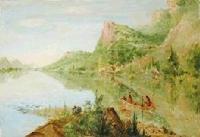
Winnebago Shooting Ducks (1836-1837)
George Catlin
"Try
to do something for your people -- something difficult. Have pity on
your people and love them. If a man is poor, help him. Give him and his
family food, give them whatever they ask for. If there is discord among
your people, intercede. Immerse yourself totally in your own language
and you will receive culture as a byproduct. The soul and culture of a
people are reflected in their language."
Stories
Boy Stolen by Thunderbird
Holy Song (Medicine Song)
Some Adventures of the Little Hare
The Encyclopedia of Hotc‚k
(Winnebago) Mythology

A Gallery of Hotc‚k N otables
Hotc‚k (Winnebago) Language Studies
Hotc‚k
(Winnebago) Pictures
(includes pictographs and symbols)
Winnebago
were called "people of the filthy water" and even the English called
them Stinkards. They belonged to the Siouan family, related to some
Iowa, Oto, and Missouri bands. Winnebago of ancient times lived on
Green Bay in Wisconsin territory, extending inland to Lake Winnebago.
Though they generally maintained peaceful relations with surrounding
tribes, in 1671 they were nearly destroyed by Illinois tribe raiders,
but recovered from the surprise attack. Winnebagoes thrived upon a
delicious native grass they named wild-rice, which grew abundantly in
lakes, ponds, and streambeds. These plants, self- seeding in spring and
summer and harvested from canoes and barges in fall, maintained their
people in good health. They also hunted much game for meat and furs. By
treaty in 1825 and 1830 they ceded all of their lands to the federal
government in return for a large reservation on the west side of the
Mississippi River above the Iowa River. Later, Winnebago moved to
another reservation in Minnesota, then to Nebraska where they remain.
Winnebago are known as a mother tribe of Siouan linguistic families.
 Return to
Indigenous Peoples' Literature
Return to
Indigenous Peoples' Literature
Compiled by: Glenn Welker
This site has been accessed over 10,000,000 times since February 8,
1996.



 Return to
Indigenous Peoples' Literature
Return to
Indigenous Peoples' Literature